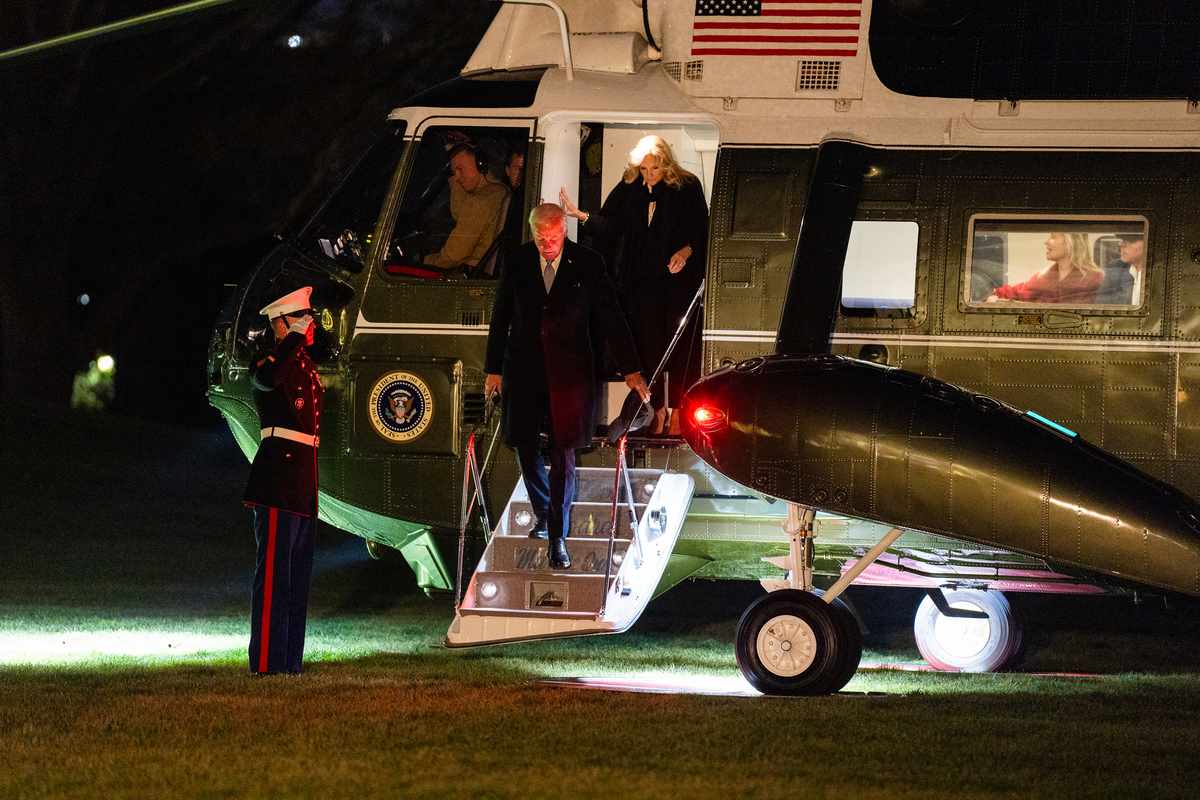
President Joe Biden and Jill Biden arrive at the White House on Thursday.
15:13 JST, December 24, 2024
A high-level government review board has told the White House it is unable to reach a consensus on the national security risks involved in Nippon Steel’s proposed acquisition of U.S. Steel, likely setting the stage for President Joe Biden to kill the deal.
The Committee on Foreign Investment in the United States (CFIUS) delivered its final evaluation of the deal late Monday, according to two people familiar with the matter, speaking on the condition of anonymity to disclose confidential information. The White House confirmed receipt shortly before 9 p.m.
CFIUS said Monday that allowing the Japanese industrial giant to purchase the once-iconic U.S. company could lead to a reduction in domestic steel output, which would represent “a national security risk.”
Nippon Steel said it could eliminate that risk by appointing U.S. citizens to top management and board of director positions at U.S. Steel. But the committee was divided in its view of whether those remedies would be sufficient.
With the Treasury-led panel deadlocked, the final decision now falls to the president, who is legally required to act within 15 days.
Biden has publicly opposed the transaction since March, saying it was “vital” that U.S. Steel, the nation’s third-ranked steel producer, remained American-owned. Even as lobbying around the deal continued in recent days, White House aides said they expect him to block the deal.
Such a decision would mark a victory for David McCall, president of the United Steelworkers union, who has insisted the deal would be “bad for workers.” But it also would draw an immediate legal challenge, Nippon Steel and U.S. Steel have warned the government.
In a letter to the committee on Dec. 17, attorneys for the two steelmakers assailed the review as “littered with factual inaccuracies and omissions, misleading and incomplete statements, conjecture and hypotheticals that have no basis in fact and are plainly illogical,” according to a copy obtained by The Washington Post.
The companies also alleged that the administration review – designed by law to assess the national security implications of investments by foreign parties – has been corrupted by political considerations. The panel’s concerns about the $14.9 billion takeover, spelled out in a Dec. 14 update, betrayed “impermissible influence in the CFIUS process from the White House,” the steelmakers said.
Shortly after 8 p.m., Nippon Steel confirmed it had been notified of the CFIUS action. The steelmaker urged Biden to consider the company’s efforts to address any national security issues in deciding whether the acquisition should proceed.
“We are confident that our transaction should and will be approved if it fairly evaluated on its merits,” the company said.
If Biden kills the deal, the steelmakers plan to “immediately” challenge the move as a “violation of due process and the authority of the President,” the letter said. The steelmakers also told administration officials to expect civil lawsuits that would involve “extensive discovery,” an apparent reference to the possibility of embarrassing courtroom disclosures.
Nippon Steel and U.S. Steel say that Biden’s opposition to the deal stemmed from a political bargain with McCall: In return for killing the transaction, the president would get the union’s support for his reelection campaign. The union endorsed Biden in March, then backed Vice President Kamala Harris in July, after she replaced Biden on the ticket.
In opposing the deal, Biden would be acting “at the behest of third parties who oppose the transaction,” specifically McCall and Cleveland-Cliffs, a U.S.-based steelmaker that Nippon Steel outbid for U.S. Steel, the letter said
In several telephone calls with investors this year, Lourenco Goncalves, Cleveland-Cliffs’s CEO, “repeatedly asserted that the CFIUS process would be a sham used by the President as cover to kill the transactions. Lourenco Goncalves repeatedly has asserted that he and David McCall have been assured of this by senior Administration officials with whom they have spoken directly,” the letter said.
The letter also references “impermissible U.S. government communications with McCall and Cliffs, implicating serious potential securities and other federal law violations.”
Saloni Sharma, a White House spokeswoman, denied that the president had prejudged the case as part of a political deal.
“This is not true. The president has been clear that he will continue to see what the CFIUS process yields,” she said.
In response, McCall said the union had made no secret of its opposition to Nippon Steel’s bid for U.S. Steel. He criticized the Japanese company for violating trade laws by dumping steel, or selling it below production cost, in the United States.
“Nippon’s efforts to circulate unfounded rumors and threats of legal action are regrettable, but ultimately, they’re no more than a distraction from the dangers the company’s acquisition of U.S. Steel poses,” he said.
Cleveland-Cliffs did not immediately respond to a request for comment.
Top Articles in News Services
-

Survey Shows False Election Info Perceived as True
-

Hong Kong Ex-Publisher Jimmy Lai’s Sentence Raises International Outcry as China Defends It
-

Japan’s Nikkei Stock Average Touches 58,000 as Yen, Jgbs Rally on Election Fallout (UPDATE 1)
-

Japan’s Nikkei Stock Average Falls as US-Iran Tensions Unsettle Investors (UPDATE 1)
-

Trump Names Former Federal Reserve Governor Warsh as the Next Fed Chair, Replacing Powell
JN ACCESS RANKING
-

Producer Behind Pop Group XG Arrested for Cocaine Possession
-

Japan PM Takaichi’s Cabinet Resigns en Masse
-

Man Infected with Measles Reportedly Dined at Restaurant in Tokyo Station
-

Israeli Ambassador to Japan Speaks about Japan’s Role in the Reconstruction of Gaza
-

Videos Plagiarized, Reposted with False Subtitles Claiming ‘Ryukyu Belongs to China’; Anti-China False Information Also Posted in Japan
























